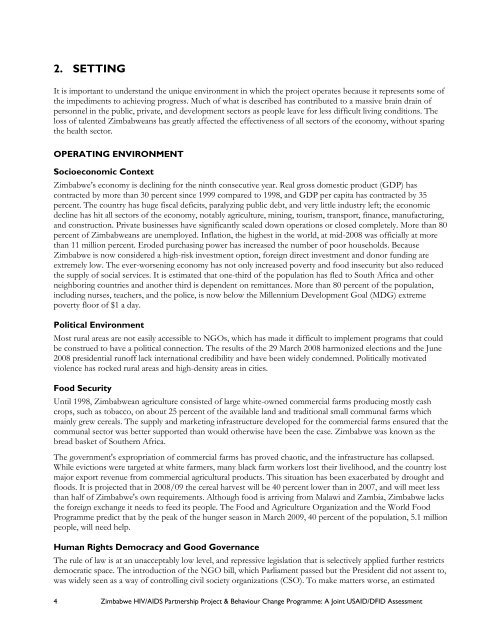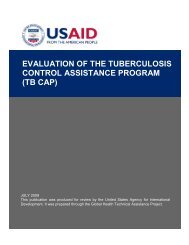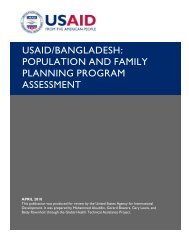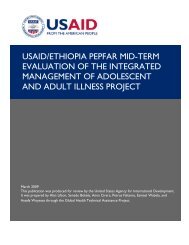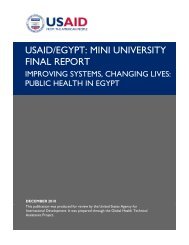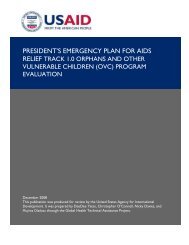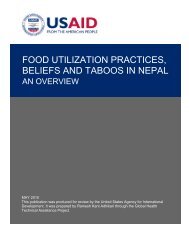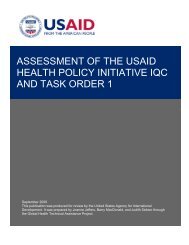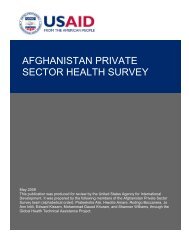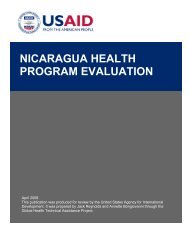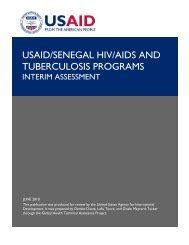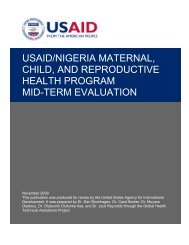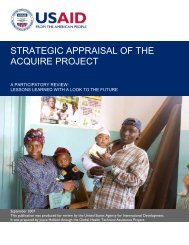Zimbabwe HIV/AIDS Partnership Project & Behaviour Change
Zimbabwe HIV/AIDS Partnership Project & Behaviour Change
Zimbabwe HIV/AIDS Partnership Project & Behaviour Change
- No tags were found...
You also want an ePaper? Increase the reach of your titles
YUMPU automatically turns print PDFs into web optimized ePapers that Google loves.
2. SETTINGIt is important to understand the unique environment in which the project operates because it represents some ofthe impediments to achieving progress. Much of what is described has contributed to a massive brain drain ofpersonnel in the public, private, and development sectors as people leave for less difficult living conditions. Theloss of talented <strong>Zimbabwe</strong>ans has greatly affected the effectiveness of all sectors of the economy, without sparingthe health sector.OPERATING ENVIRONMENTSocioeconomic Context<strong>Zimbabwe</strong>’s economy is declining for the ninth consecutive year. Real gross domestic product (GDP) hascontracted by more than 30 percent since 1999 compared to 1998, and GDP per capita has contracted by 35percent. The country has huge fiscal deficits, paralyzing public debt, and very little industry left; the economicdecline has hit all sectors of the economy, notably agriculture, mining, tourism, transport, finance, manufacturing,and construction. Private businesses have significantly scaled down operations or closed completely. More than 80percent of <strong>Zimbabwe</strong>ans are unemployed. Inflation, the highest in the world, at mid-2008 was officially at morethan 11 million percent. Eroded purchasing power has increased the number of poor households. Because<strong>Zimbabwe</strong> is now considered a high-risk investment option, foreign direct investment and donor funding areextremely low. The ever-worsening economy has not only increased poverty and food insecurity but also reducedthe supply of social services. It is estimated that one-third of the population has fled to South Africa and otherneighboring countries and another third is dependent on remittances. More than 80 percent of the population,including nurses, teachers, and the police, is now below the Millennium Development Goal (MDG) extremepoverty floor of $1 a day.Political EnvironmentMost rural areas are not easily accessible to NGOs, which has made it difficult to implement programs that couldbe construed to have a political connection. The results of the 29 March 2008 harmonized elections and the June2008 presidential runoff lack international credibility and have been widely condemned. Politically motivatedviolence has rocked rural areas and high-density areas in cities.Food SecurityUntil 1998, <strong>Zimbabwe</strong>an agriculture consisted of large white-owned commercial farms producing mostly cashcrops, such as tobacco, on about 25 percent of the available land and traditional small communal farms whichmainly grew cereals. The supply and marketing infrastructure developed for the commercial farms ensured that thecommunal sector was better supported than would otherwise have been the case. <strong>Zimbabwe</strong> was known as thebread basket of Southern Africa.The government's expropriation of commercial farms has proved chaotic, and the infrastructure has collapsed.While evictions were targeted at white farmers, many black farm workers lost their livelihood, and the country lostmajor export revenue from commercial agricultural products. This situation has been exacerbated by drought andfloods. It is projected that in 2008/09 the cereal harvest will be 40 percent lower than in 2007, and will meet lessthan half of <strong>Zimbabwe</strong>'s own requirements. Although food is arriving from Malawi and Zambia, <strong>Zimbabwe</strong> lacksthe foreign exchange it needs to feed its people. The Food and Agriculture Organization and the World FoodProgramme predict that by the peak of the hunger season in March 2009, 40 percent of the population, 5.1 millionpeople, will need help.Human Rights Democracy and Good GovernanceThe rule of law is at an unacceptably low level, and repressive legislation that is selectively applied further restrictsdemocratic space. The introduction of the NGO bill, which Parliament passed but the President did not assent to,was widely seen as a way of controlling civil society organizations (CSO). To make matters worse, an estimated4 <strong>Zimbabwe</strong> <strong>HIV</strong>/<strong>AIDS</strong> <strong>Partnership</strong> <strong>Project</strong> & <strong>Behaviour</strong> <strong>Change</strong> Programme: A Joint USAID/DFID Assessment


